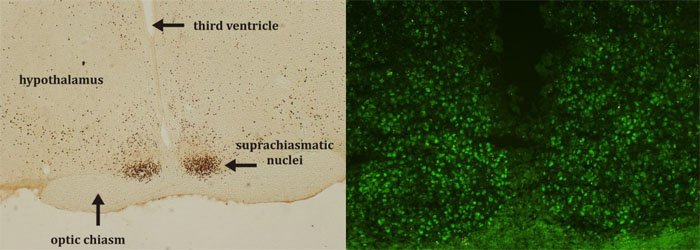
Central clock in the brain - the suprachiasmatic nucleus. A cross section of the brain at the level of the hypothalamus is shown. Immunohistochemistry (bright field on the left and fluorescence on the right) was used to detect clock cells.
In the center of our interest is the timing system, biological clock of mammals, including humans. The system ensures temporal coordination of physiological processes in our body so that they take place at the right time of day and are optimally timed.
A failure of temporal regulation have a negative impact on human health. We focus on the following questions:
- What are the mechanisms for entraining the timing system in the body and what are the consequences of failure of this mechanism?
- How does the timing system develop and how is it being entrained during ontogeny?
- How is the timing system of humans entrained in real life conditions, both in health and in disease?
Projects
The mammalian biological clock initiates its ontogenesis already during embryonic development in the maternal uterus. Newborn mammals are equipped with clock running in accordance with the maternal clock. We focus on investigating when and how do the newborn clock develop and entrain.
More
We explore the entrainment of the circadian clock and its disorders on various experimental models in vivo and in vitro.
More
Research in our laboratory focuses on the timing system not only in healthy volunteers but also in patients suffering from disorders associated with disrupted sleep pattern. The aim of our projects is to find connections between the functional state of the timing system and those disorders.
More
Achievements
Publications
Olejníková, Lucie - Polidarová, Lenka - Paušlyová, Lucia - Sládek, Martin - Sumová, Alena
.
Diverse development and higher sensitivity of the circadian clocks to changes in maternal-feeding regime in a rat model of cardio-metabolic disease
.
Chronobiology International. 2015, Vol. 32, 4, p. 531-547
.
IF = 3.343
[ASEP]
[
doi
]
Nováková, Marta - Praško, J. - Látalová, K. - Sládek, Martin - Sumová, Alena
.
The circadian system of patients with bipolar disorder differs in episodes of mania and depression
.
Bipolar Disorders. 2015, Vol. 17, 3, p. 303-314
.
IF = 4.965
[ASEP]
[
doi
]
Houdek, Pavel - Polidarová, Lenka - Nováková, Marta - Matějů, Kristýna - Kubík, Štěpán - Sumová, Alena
.
Melatonin administered during the fetal stage affects circadian clock in the suprachiasmatic nucleus but not in the liver
.
Developmental Neurobiology. 2015, Vol. 75, 2, p. 131-144
.
IF = 3.370
[ASEP]
[
doi
]
Soták, Matúš - Sumová, Alena - Pácha, Jiří
.
Cross-talk between the circadian clock and the cell cycle in cancer
.
Annals of Medicine 2014, roč. 46, 4, p. 221-232. ISSN 0785-3890.
IF = 3.886
[ASEP]
[
doi
]
Polidarová, Lenka - Olejníková, Lucie - Paušlyová, Lucia - Sládek, Martin - Soták, Matúš - Pácha, Jiří - Sumová, Alena
.
Development and entrainment of the colonic circadian clock during ontogenesis
.
American Journal of Physiology-Gastrointestinal and Liver Physiology 2014, roč. 306, 4, g346-g356. ISSN 0193-1857.
IF = 3.798
[ASEP]
[
doi
]
Show more
 Central clock in the brain - the suprachiasmatic nucleus. A cross section of the brain at the level of the hypothalamus is shown. Immunohistochemistry (bright field on the left and fluorescence on the right) was used to detect clock cells.
Central clock in the brain - the suprachiasmatic nucleus. A cross section of the brain at the level of the hypothalamus is shown. Immunohistochemistry (bright field on the left and fluorescence on the right) was used to detect clock cells.





